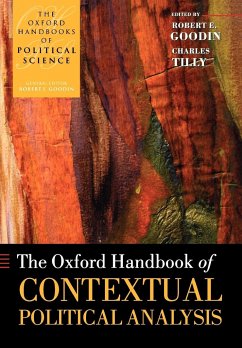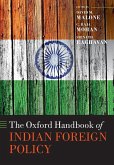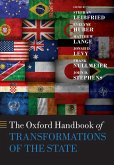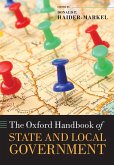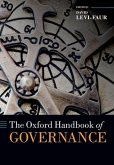The Oxford Handbook of Contextual Political Analysis
Herausgeber: Goodin, Robert E.; Tilly, Charles
The Oxford Handbook of Contextual Political Analysis
Herausgeber: Goodin, Robert E.; Tilly, Charles
- Broschiertes Buch
- Merkliste
- Auf die Merkliste
- Bewerten Bewerten
- Teilen
- Produkt teilen
- Produkterinnerung
- Produkterinnerung
Oxford Handbooks of Political Science are the essential guide to the state of political science today. With engaging contributions from 51 major international scholars, the Oxford Handbook of Contextual Political Analysis provides the key point of reference for anyone working in political science and beyond.
Andere Kunden interessierten sich auch für
![The Oxford Handbook of Indian Foreign Policy The Oxford Handbook of Indian Foreign Policy]() The Oxford Handbook of Indian Foreign Policy50,99 €
The Oxford Handbook of Indian Foreign Policy50,99 €![The Oxford Handbook of Transformations of the State The Oxford Handbook of Transformations of the State]() The Oxford Handbook of Transformations of the State50,99 €
The Oxford Handbook of Transformations of the State50,99 €![The Oxford Handbook of Swedish Politics The Oxford Handbook of Swedish Politics]() The Oxford Handbook of Swedish Politics56,99 €
The Oxford Handbook of Swedish Politics56,99 €![The Oxford Handbook of United Nations Peacekeeping Operations The Oxford Handbook of United Nations Peacekeeping Operations]() The Oxford Handbook of United Nations Peacekeeping Operations51,99 €
The Oxford Handbook of United Nations Peacekeeping Operations51,99 €![The Oxford Handbook of State and Local Government The Oxford Handbook of State and Local Government]() The Oxford Handbook of State and Local Government60,99 €
The Oxford Handbook of State and Local Government60,99 €![The Oxford Handbook of Historical Institutionalism The Oxford Handbook of Historical Institutionalism]() The Oxford Handbook of Historical Institutionalism56,99 €
The Oxford Handbook of Historical Institutionalism56,99 €![The Oxford Handbook of Governance The Oxford Handbook of Governance]() The Oxford Handbook of Governance50,99 €
The Oxford Handbook of Governance50,99 €-
-
-
Oxford Handbooks of Political Science are the essential guide to the state of political science today. With engaging contributions from 51 major international scholars, the Oxford Handbook of Contextual Political Analysis provides the key point of reference for anyone working in political science and beyond.
Hinweis: Dieser Artikel kann nur an eine deutsche Lieferadresse ausgeliefert werden.
Hinweis: Dieser Artikel kann nur an eine deutsche Lieferadresse ausgeliefert werden.
Produktdetails
- Produktdetails
- Verlag: OUP Oxford
- Seitenzahl: 882
- Erscheinungstermin: 19. Juni 2008
- Englisch
- Abmessung: 244mm x 170mm x 47mm
- Gewicht: 1489g
- ISBN-13: 9780199548446
- ISBN-10: 0199548447
- Artikelnr.: 26486072
- Herstellerkennzeichnung
- Libri GmbH
- Europaallee 1
- 36244 Bad Hersfeld
- gpsr@libri.de
- Verlag: OUP Oxford
- Seitenzahl: 882
- Erscheinungstermin: 19. Juni 2008
- Englisch
- Abmessung: 244mm x 170mm x 47mm
- Gewicht: 1489g
- ISBN-13: 9780199548446
- ISBN-10: 0199548447
- Artikelnr.: 26486072
- Herstellerkennzeichnung
- Libri GmbH
- Europaallee 1
- 36244 Bad Hersfeld
- gpsr@libri.de
Robert E. Goodin is Distinguished Professor of Social and Political Theory and Philosophy at the Research School of Social Sciences at Australian National University. Charles Tilly was Joseph L. Buttenwieser Professor of Social Sciences at Columbia University.
* Part I. Introduction
* 1: Charles Tilly and Robert E. Goodin: It Depends
* Part II. Philosophy Matters
* 2: Philip Pettit: Why and How Philosophy Matters
* 3: Louise Antony: The Socialization of Epistemology
* 4: Colin Hay: Political Ontology
* 5: James N. Druckman and Arthur Lupia: Mind, Will, and Choice
* 6: Rod Aya: Theory, Fact, Logic
* Part III. Psychology Matters
* 7: Kathleen M. McGraw: Why and How Psychology Matters
* 8: James M. Jasper: Motivation and Emotion
* 9: Samuel Bowles and Herbert Gintis: Social Preferences, Homo
Economicus, and Zoon Politikon
* 10: Francesca Polletta and M. Kai Ho: Frames and Their Consequences
* 11: Aleida Assmann: Memory, Individual and Collective
* Part IV. Ideas Matter
* 12: Dietrich Rueschemeyer: Why and How Ideas Matter
* 13: Richard Price: Detecting Ideas and Their Effects
* 14: Neta C. Crawford: How Previous Ideas Affect Later Ideas
* 15: Jennifer L. Hochschild: How Ideas Affect Actions
* 16: Lee Clarke: Mistaken Ideas and Their Effects
* Part V. Culture Matters
* 17: Michael Thompson, Marco Verweij, and Richard J. Ellis: Why And
How Culture Matters
* 18: Pamela Ballinger: How to Detect Culture and its Effects
* 19: Courtney Jung: Race, Ethnicity, Religion
* 20: Susan Gal: Language, Its Stakes and Its Effects
* 21: Paul Lichterman and Daniel Cefaï: The Idea of Political Culture
* Part VI. History Matters
* 22: Charles Tilly: Why and How History Matters
* 23: Roberto Franzosi: Historical Knowledge and Evidence
* 24: James Mahoney and Daniel Schensul: Historical Context and Path
Dependence
* 25: Ruth Berins Collier and Sebastián Mazzuca: Does History Repeat?
* 26: Patrick Thaddeus Jackson: The Present as History
* Part VII. Place Matters
* 27: Göran Therborn: Why and How Place Matters
* 28: R. Bin Wong: Detecting the Significance of Place
* 29: Nigel J. Thrift: Space, Place, and Time
* 30: Javier Auyero: Spaces and Places as Sites and Objects of Politics
* 31: Don Kalb: Uses of Local Knowledge
* Part VIII. Population Matters
* 32: David Levine: Why and How Population Matters
* 33: Bruce Curtis: The Politics of Demography
* 34: Gary P. Freeman: Politics and Mass Immigration
* 35: Jeffrey Herbst: Population Change, Urbanization, and Political
Consolidation
* 36: David I. Kertzer and Dominique Arel: Population Composition as an
Object of Political Struggle
* Part IX. Technology Matters
* 37: Wiebe E. Bijker: Why and How Technology Matters
* 38: Judy Wacjman: The Gendered Politics of Technology
* 39: Wim A. Smit: Military Technologies and Politics
* 40: Sheila Jasanoff: Technology as a Site and Object of Politics
* Part X. Old and New
* 41: David E. Apter: Duchamp's Urinal: Who Says What's Rational When
Things Get Tough?
* 42: Lucian Pye: The Behavioral Revolution and the Remaking of
Comparative Politics
* 1: Charles Tilly and Robert E. Goodin: It Depends
* Part II. Philosophy Matters
* 2: Philip Pettit: Why and How Philosophy Matters
* 3: Louise Antony: The Socialization of Epistemology
* 4: Colin Hay: Political Ontology
* 5: James N. Druckman and Arthur Lupia: Mind, Will, and Choice
* 6: Rod Aya: Theory, Fact, Logic
* Part III. Psychology Matters
* 7: Kathleen M. McGraw: Why and How Psychology Matters
* 8: James M. Jasper: Motivation and Emotion
* 9: Samuel Bowles and Herbert Gintis: Social Preferences, Homo
Economicus, and Zoon Politikon
* 10: Francesca Polletta and M. Kai Ho: Frames and Their Consequences
* 11: Aleida Assmann: Memory, Individual and Collective
* Part IV. Ideas Matter
* 12: Dietrich Rueschemeyer: Why and How Ideas Matter
* 13: Richard Price: Detecting Ideas and Their Effects
* 14: Neta C. Crawford: How Previous Ideas Affect Later Ideas
* 15: Jennifer L. Hochschild: How Ideas Affect Actions
* 16: Lee Clarke: Mistaken Ideas and Their Effects
* Part V. Culture Matters
* 17: Michael Thompson, Marco Verweij, and Richard J. Ellis: Why And
How Culture Matters
* 18: Pamela Ballinger: How to Detect Culture and its Effects
* 19: Courtney Jung: Race, Ethnicity, Religion
* 20: Susan Gal: Language, Its Stakes and Its Effects
* 21: Paul Lichterman and Daniel Cefaï: The Idea of Political Culture
* Part VI. History Matters
* 22: Charles Tilly: Why and How History Matters
* 23: Roberto Franzosi: Historical Knowledge and Evidence
* 24: James Mahoney and Daniel Schensul: Historical Context and Path
Dependence
* 25: Ruth Berins Collier and Sebastián Mazzuca: Does History Repeat?
* 26: Patrick Thaddeus Jackson: The Present as History
* Part VII. Place Matters
* 27: Göran Therborn: Why and How Place Matters
* 28: R. Bin Wong: Detecting the Significance of Place
* 29: Nigel J. Thrift: Space, Place, and Time
* 30: Javier Auyero: Spaces and Places as Sites and Objects of Politics
* 31: Don Kalb: Uses of Local Knowledge
* Part VIII. Population Matters
* 32: David Levine: Why and How Population Matters
* 33: Bruce Curtis: The Politics of Demography
* 34: Gary P. Freeman: Politics and Mass Immigration
* 35: Jeffrey Herbst: Population Change, Urbanization, and Political
Consolidation
* 36: David I. Kertzer and Dominique Arel: Population Composition as an
Object of Political Struggle
* Part IX. Technology Matters
* 37: Wiebe E. Bijker: Why and How Technology Matters
* 38: Judy Wacjman: The Gendered Politics of Technology
* 39: Wim A. Smit: Military Technologies and Politics
* 40: Sheila Jasanoff: Technology as a Site and Object of Politics
* Part X. Old and New
* 41: David E. Apter: Duchamp's Urinal: Who Says What's Rational When
Things Get Tough?
* 42: Lucian Pye: The Behavioral Revolution and the Remaking of
Comparative Politics
* Part I. Introduction
* 1: Charles Tilly and Robert E. Goodin: It Depends
* Part II. Philosophy Matters
* 2: Philip Pettit: Why and How Philosophy Matters
* 3: Louise Antony: The Socialization of Epistemology
* 4: Colin Hay: Political Ontology
* 5: James N. Druckman and Arthur Lupia: Mind, Will, and Choice
* 6: Rod Aya: Theory, Fact, Logic
* Part III. Psychology Matters
* 7: Kathleen M. McGraw: Why and How Psychology Matters
* 8: James M. Jasper: Motivation and Emotion
* 9: Samuel Bowles and Herbert Gintis: Social Preferences, Homo
Economicus, and Zoon Politikon
* 10: Francesca Polletta and M. Kai Ho: Frames and Their Consequences
* 11: Aleida Assmann: Memory, Individual and Collective
* Part IV. Ideas Matter
* 12: Dietrich Rueschemeyer: Why and How Ideas Matter
* 13: Richard Price: Detecting Ideas and Their Effects
* 14: Neta C. Crawford: How Previous Ideas Affect Later Ideas
* 15: Jennifer L. Hochschild: How Ideas Affect Actions
* 16: Lee Clarke: Mistaken Ideas and Their Effects
* Part V. Culture Matters
* 17: Michael Thompson, Marco Verweij, and Richard J. Ellis: Why And
How Culture Matters
* 18: Pamela Ballinger: How to Detect Culture and its Effects
* 19: Courtney Jung: Race, Ethnicity, Religion
* 20: Susan Gal: Language, Its Stakes and Its Effects
* 21: Paul Lichterman and Daniel Cefaï: The Idea of Political Culture
* Part VI. History Matters
* 22: Charles Tilly: Why and How History Matters
* 23: Roberto Franzosi: Historical Knowledge and Evidence
* 24: James Mahoney and Daniel Schensul: Historical Context and Path
Dependence
* 25: Ruth Berins Collier and Sebastián Mazzuca: Does History Repeat?
* 26: Patrick Thaddeus Jackson: The Present as History
* Part VII. Place Matters
* 27: Göran Therborn: Why and How Place Matters
* 28: R. Bin Wong: Detecting the Significance of Place
* 29: Nigel J. Thrift: Space, Place, and Time
* 30: Javier Auyero: Spaces and Places as Sites and Objects of Politics
* 31: Don Kalb: Uses of Local Knowledge
* Part VIII. Population Matters
* 32: David Levine: Why and How Population Matters
* 33: Bruce Curtis: The Politics of Demography
* 34: Gary P. Freeman: Politics and Mass Immigration
* 35: Jeffrey Herbst: Population Change, Urbanization, and Political
Consolidation
* 36: David I. Kertzer and Dominique Arel: Population Composition as an
Object of Political Struggle
* Part IX. Technology Matters
* 37: Wiebe E. Bijker: Why and How Technology Matters
* 38: Judy Wacjman: The Gendered Politics of Technology
* 39: Wim A. Smit: Military Technologies and Politics
* 40: Sheila Jasanoff: Technology as a Site and Object of Politics
* Part X. Old and New
* 41: David E. Apter: Duchamp's Urinal: Who Says What's Rational When
Things Get Tough?
* 42: Lucian Pye: The Behavioral Revolution and the Remaking of
Comparative Politics
* 1: Charles Tilly and Robert E. Goodin: It Depends
* Part II. Philosophy Matters
* 2: Philip Pettit: Why and How Philosophy Matters
* 3: Louise Antony: The Socialization of Epistemology
* 4: Colin Hay: Political Ontology
* 5: James N. Druckman and Arthur Lupia: Mind, Will, and Choice
* 6: Rod Aya: Theory, Fact, Logic
* Part III. Psychology Matters
* 7: Kathleen M. McGraw: Why and How Psychology Matters
* 8: James M. Jasper: Motivation and Emotion
* 9: Samuel Bowles and Herbert Gintis: Social Preferences, Homo
Economicus, and Zoon Politikon
* 10: Francesca Polletta and M. Kai Ho: Frames and Their Consequences
* 11: Aleida Assmann: Memory, Individual and Collective
* Part IV. Ideas Matter
* 12: Dietrich Rueschemeyer: Why and How Ideas Matter
* 13: Richard Price: Detecting Ideas and Their Effects
* 14: Neta C. Crawford: How Previous Ideas Affect Later Ideas
* 15: Jennifer L. Hochschild: How Ideas Affect Actions
* 16: Lee Clarke: Mistaken Ideas and Their Effects
* Part V. Culture Matters
* 17: Michael Thompson, Marco Verweij, and Richard J. Ellis: Why And
How Culture Matters
* 18: Pamela Ballinger: How to Detect Culture and its Effects
* 19: Courtney Jung: Race, Ethnicity, Religion
* 20: Susan Gal: Language, Its Stakes and Its Effects
* 21: Paul Lichterman and Daniel Cefaï: The Idea of Political Culture
* Part VI. History Matters
* 22: Charles Tilly: Why and How History Matters
* 23: Roberto Franzosi: Historical Knowledge and Evidence
* 24: James Mahoney and Daniel Schensul: Historical Context and Path
Dependence
* 25: Ruth Berins Collier and Sebastián Mazzuca: Does History Repeat?
* 26: Patrick Thaddeus Jackson: The Present as History
* Part VII. Place Matters
* 27: Göran Therborn: Why and How Place Matters
* 28: R. Bin Wong: Detecting the Significance of Place
* 29: Nigel J. Thrift: Space, Place, and Time
* 30: Javier Auyero: Spaces and Places as Sites and Objects of Politics
* 31: Don Kalb: Uses of Local Knowledge
* Part VIII. Population Matters
* 32: David Levine: Why and How Population Matters
* 33: Bruce Curtis: The Politics of Demography
* 34: Gary P. Freeman: Politics and Mass Immigration
* 35: Jeffrey Herbst: Population Change, Urbanization, and Political
Consolidation
* 36: David I. Kertzer and Dominique Arel: Population Composition as an
Object of Political Struggle
* Part IX. Technology Matters
* 37: Wiebe E. Bijker: Why and How Technology Matters
* 38: Judy Wacjman: The Gendered Politics of Technology
* 39: Wim A. Smit: Military Technologies and Politics
* 40: Sheila Jasanoff: Technology as a Site and Object of Politics
* Part X. Old and New
* 41: David E. Apter: Duchamp's Urinal: Who Says What's Rational When
Things Get Tough?
* 42: Lucian Pye: The Behavioral Revolution and the Remaking of
Comparative Politics

